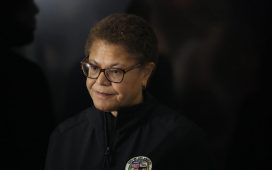With help from Tanya Snyder, Brianna Gurciullo and Stephanie Beasley
Editor’s Note: This edition of Morning Transportation is published weekdays at 10 a.m. POLITICO Pro Transportation subscribers hold exclusive early access to the newsletter each morning at 6 a.m. Learn more about POLITICO Pro’s comprehensive policy intelligence coverage, policy tools and services, at politicopro.com.
Advertisement
— The big money numbers for infrastructure in President Donald Trump’s budget proposal aren’t grounded in political reality.
— A new DOT decision has opened up the door to potential federal funding for part of the contentious Gateway project.
— Today’s House hearing on autonomous vehicles will be a chance to see who’s pressing the gas or the brakes as lawmakers again try to develop self-driving legislation.
IT’S TUESDAY: Thanks for tuning in to POLITICO’s Morning Transportation, your daily tipsheet on all things trains, planes, automobiles and ports. Get in touch with tips, feedback or song lyric suggestions at smintz@politico.com or @samjmintz.
“There’s a train every day / Leading either way / There’s a world you know / There’s a way to go.”
LISTEN HERE: Follow MT’s playlist on Spotify. What better way to start your day than with songs (picked by us and readers) about roads, rails, rivers and runways.
BIG, BOLD AND UNLIKELY: The Trump administration released its proposed fiscal 2021 budget on Monday, but ultimately many of its proposals will be tossed out altogether at appropriations time.
Here’s what’s new: As part of a proposed $1 trillion in infrastructure investment, the budget suggests a $810 billion, 10-year surface transportation reauthorization, double the length of the more traditional bills the House and Senate are working on now. The document says the White House will put forward its own version of the authorization, despite Trump endorsing the Senate’s bill.
How would it pay for that legislation? The request says the 10-year bill will be funded with contract authority, but that’s not spendable money — it’s a budgetary tool that allows states or agencies to enter into binding contracts, which the federal government promises to pay back later, usually through appropriated money. There’s very little chance lawmakers would get on board with that (although, they haven’t had much luck figuring out how to fill the Highway Trust Fund themselves).
While the topline for DOT would represent a 13 percent cut to discretionary spending, the proposal bumps up funding for NHTSA and FMCSA, in part to fund a crash causation study the agencies are planning in 2021.
There’s also $30 million for boosting the FAA’s oversight. On a call with reporters, Deputy FAA Administrator Dan Elwell said some of the money would go toward filling 13 full-time posts in a new Organization Designation Authorization office, which Congress required the FAA to form. Another portion would be for “technological improvements” to FAA data gathering and analysis systems.
What will Congress reject? Most of the document’s major proposed cuts, including to Amtrak.
The big news from DHS’ budget: It includes a proposed pay bump for TSA screeners and a plan to create dedicated funding for investments in trade and travel infrastructure technologies. But it also again proposes slashing several TSA programs, including exit-lane staffing, reimbursement grants for airports that hire local law enforcement and Visible Intermodal Prevention and Response teams, our Stephanie Beasley writes.
DOT BENDS ON GATEWAY: In what one senator called the “most significant step forward” on the Gateway project since the beginning of the Trump administration, DOT announced late Monday that the Portal North Bridge project would be eligible to receive federal funding. The Hudson River rail tunnel still hasn’t met the criteria for federal grant money, but as POLITICO’s Ryan Hutchins reports, it’s the “first evidence in years that the long-stalled initiatives could see action under the current administration.”
Federal transportation officials will still need to approve the application for the Portal North project, which would replace a century-old bridge that carries Amtrak and commuter trains over the Hackensack River in New Jersey.
TRUMP LIKES THE SENATE BILL, BUT: He’s made clear, both in his budget request and his State of the Union last week, that he supports the Senate’s approach to infrastructure, particularly the surface transportation authorization bill that the Environment and Public Works Committee approved on a bipartisan vote.
Coming down on a different side: mayors, who have officially endorsed House Democrats’ approach to a broader infrastructure plan. The U.S. Conference of Mayors said in a letter last week that the “Moving Forward Framework” is “responsive to the infrastructure priorities of the nation’s mayors.” The group hasn’t weighed in on the Senate bill.
WHAT’S COOKING ON AV LEGISLATION: The House Energy and Commerce Committee hasn’t yet introduced a new bill to create a federal framework for the testing and deployment of autonomous vehicles, but a hearing today on the issue could shed light on the lawmakers’ thinking and concerns.
The gas: For example, Cathy McMorris Rodgers, ranking member of the subcommittee writing the bill, plans to sound the alarm that “the U.S. has fallen behind” on AV innovation. China, she will say according to prepared remarks, is testing in California to perfect a product that will be commercialized in China, while U.S. companies still lack a viable path to deployment here.
The brake: Cathy Chase, president of Advocates for Highway and Auto Safety, will urge Congress to require new performance standards, including a cybersecurity standard and a “vision test” for AVs. Plus, the group wants all driverless cars to have human controls so the automated system can be overridden. That’s a no-go for developers. Advocates unveiled a new survey today showing that while the public is still largely apprehensive about driverless cars, that apprehension could be mitigated if people felt confident the government was enforcing minimum safety requirements.
The enforcer: Daniel Hinkle, senior state affairs counsel for the American Association for Justice, will also argue the government must ensure the safety of the vehicles before they’re deployed. His testimony will also show that the group representing trial lawyers is still opposed to the use of forced arbitration for people hurt by driverless cars — that opposition helped tank the previous AV bill.
The cheerleader: Gary Shapiro, president and CEO of the Consumer Technology Association, will push for new rulemaking to update federal safety standards and allow tech companies and other suppliers to test on a level playing field alongside traditional automakers.
Speaking of which: The Self-Driving Coalition will announce today that its five founding members will be joined by three new ones, all tech companies. Having Argo AI, Aurora and Nuro in the coalition could help strengthen the role of robotics and artificial intelligence companies in developing new rules. You saw it here first.
ANOTHER BOEING 737 MAX-RELATED REVIEW: The DOT inspector general’s office said Monday that it will look at how the FAA sets pilot training requirements for both domestic and foreign airlines that operate large, FAA-certified passenger airplanes, as well as what training related to flight deck automation is required internationally. The Democratic and Republican leaders of the House Transportation Committee had asked the IG to examine international pilot training standards in the wake of the two Boeing 737 MAX crashes. A report on the office’s separate audit of the MAX’s certification is expected in the spring.
FIRST IN MT: CORONAVIRUS BRIEFING THIS WEEK: Ted Cruz (R-Texas), head of the Commerce Committee’s aviation panel, is holding a briefing for members of the committee on the coronavirus on Wednesday. Featuring officials from DOT, CDC and WHO, the briefing will focus on the role that commercial air travel is playing in both spreading and containing the disease, according to Cruz’s office.
FOREIGN DRONE BAN MOVES TO SENATE: The House passed legislation (H.R. 4753 (116)) on Monday that would block DHS from buying or using foreign-made drones. The bill easily passed out of the chamber by voice vote despite Chinese dronemaker DJI sending an open letter to lawmakers warning of the potential “negative implications” the policy might have on FEMA’s natural disaster and recovery operations. The company said that, like the Interior’s recent decision to suspend non-emergency flights for its mostly Chinese-made drone fleet, the House proposal “unfairly targets technology based solely on where it is manufactured.”
The National Air Transportation Association has a new president and CEO: Timothy R. Obitts, who had been chief operating officer. Jason Miller will take over COO duties in addition to remaining chief financial officer of the group, which represents aviation business service providers.
— “She ran over and killed 2 children. Should she have had a car?” New York Times.
— “Judge denies Uber, Postmates request to block AB 5.” POLITICO Pro California.
— “White House calls for biggest NASA budget in decades to reach the moon, Mars.” Reuters.
— “Fiat Chrysler plans to launch a robot taxi service in China.” The Verge.
— “When coronavirus takes over a ship it’s too late to batten hatches.” Bloomberg.
DOT appropriations run out in 232 days. The FAA reauthorization expires in 1,329 days. Highway and transit policy is up for renewal in 232 days.








